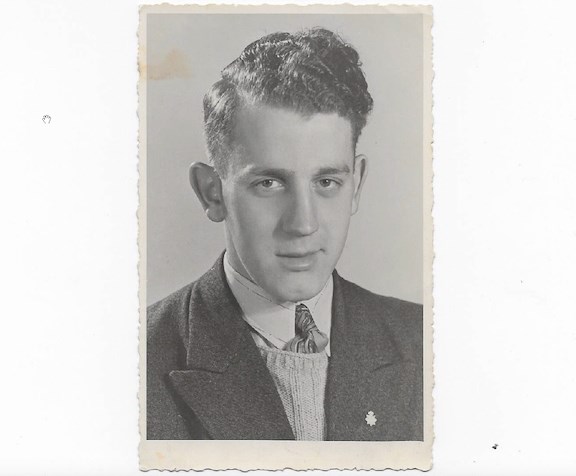 By Tom Slater and Tom St. Amand
By Tom Slater and Tom St. Amand
When Judy Van Reenen interviewed her father, Case, for a high school project, she learned the full story of his life during World War II.
Judy's teacher described Case's experiences as an “incredible history.” And rightly so.
The Van Reenens were living in Driebergen, a small town in the centre of the Netherlands, when the Germans invaded in May 1940. Case was 14, but that he was even alive was a miracle. Born two months premature on April 1, 1925, he weighed only three pounds and the local doctor didn't think he would live long.
But Case was a fighter from birth.
Case's devout mother described him as a “spirited little boy” and his son, Fred, concurs.
“My dad was fairly quiet, but if he felt something wasn't right, he'd speak up.”
Case despised what the Nazis were doing and wanted to retaliate. The occupation was a dreadful time for the Dutch. Their captors appropriated materials for themselves and the drastic shortages in food, clothing, and other basic goods culminated in the “Hongerwinter” of 1944-45. During this time alone, over 20,000 Dutch citizens perished from starvation, cold and disease.
The Nazis also used Dutch citizens for labour. Single males aged 13 to 25 were expected to register and to report for work details and thousands were sent to Germany to become forced labourers. Fortunately, a family doctor falsified a medical report, stating that Case suffered from chronic pneumonia and was unable to work.
At great risk to themselves, the Dutch formed resistance groups. Case's parents and his maternal grandparents joined the underground movement and collaborated with other activists to hide Jewish families. A few times German soldiers were within inches of finding their stowaways and Case remembers raw fear coursing through his body.
Case, though, became even more rebellious. His friends and he broke curfew and spied on the German headquarters in Driebergen. After they sabotaged some jeeps in the German transportation compound, the Germans began looking for these troublemakers. When they found them, the Germans demanded they either register to work or face the consequences.
Case, 19, registered but didn't report. Rather, his friends and he decided to join the Allied forces. For his family's safety, Case did not divulge his plan and he wouldn't see his family again for three years.
On October 13, 1944, Case and four friends set out on their bikes under the guise of collecting firewood. They cycled 50 kilometres south to Tiel, a town nestled beside the Waal River. The Germans patrolled the river, but the teens had heard that British forces were stationed in a town just across the river.
Three boys backed out, but in the early morning darkness, Case and a friend steered a rickety barge across the Waal River. Fortunately, they found some British soldiers, expressed their desire to enlist and within weeks arrived in Camp Lejeune, North Carolina.
It was here that Case and a regiment of young Dutch volunteers received their basic training before heading to Indonesia, then a Dutch colony.
In Indonesia, the fighting was brutal and Case refused to describe the atrocities and tragedies he had witnessed. Case was a man of strong faith who loved to laugh, but he told Judy these scenes “had taken a piece of his soul.”
In October 1947, Case returned to Driebergen and his parents, but he didn't stay for long.
When he learned that his brother and his sister had immigrated to Canada, he was interested in joining them and exploring new opportunities.
He met his beloved Tina, got married, and together they immigrated to Sarnia in 1950.
Case was always an excellent carpenter and he started a successful house building company before retiring in 1985. Today his grandchildren are running the company he founded decades ago.
In 2005, Case Van Reenen passed away at the age of 80. He left behind Tina, five children, and numerous grandchildren and great-grandchildren.
